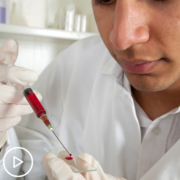Could an MPN Clinical Trial Be Right for You?
Could an MPN Clinical Trial Be Right for You? from Patient Empowerment Network on Vimeo.
Is a clinical trial your best MPN treatment option? Dr. Ruben Mesa explains the clinical trial process and how patients may benefit from participating.
Dr. Ruben Mesa is an international expert in the research and care of patients with myeloproliferative neoplasms (MPNs). He serves as director of UT Health San Antonio MD Anderson Cancer Center in San Antonio, Texas. More about this expert here.
See More From the The Path to MPN Empowerment
Related Programs:

Diagnosed with an MPN? Why You Should Consider a Second Opinion |

|

Improving Life with MPNs: The Latest Research and How to Get Involved |
Transcript:
Dr. Ruben Mesa:
There is much exciting research in myeloproliferative neoplasms. First, research trying to understand, why do people develop MPNs, and why do they progress. This is crucial research, and that this basic research to better understand the diseases will help us asses whether our treatments are having an impact slowing down the progression of the disease, and help us better design therapies that, hopefully, can cure these diseases.
Be reassured that our goal as a scientific community is to cure the MPNs. Now, until we’re able to do that, we want to be able to best control them as best we can. So, the next level of research is really in new therapies; primarily drug-based therapies, but future therapies using the immune system; potentially using vaccine therapy to try to better control the disease to make the disease as neutral in your life as possible.
Our goal, short of curing the disease is to make the disease as invisible in your life as possible. Hopefully, minimal side effects, minimal symptoms, protected against risk of blood clots or bleeding, ideally, decreasing the risk of progression, and hopefully without any significant side effects from the medication your receiving.
So, that really is our goal.
Clinical trials are a crucial way for us to improve the treatments that we have for any diseases. And in particular, in areas like myeloproliferative neoplasms where we have therapies, but we don’t have cures, clinical trials are crucial. Clinical trials are a structured way for you to be able to receive a new treatment. That treatment is closely monitored, and starts with a strong belief that that treatment is going to be beneficial for you.
Being on a clinical trial has many steps, but you are in the driver seat in each of them. So, you’re able to enroll in a study, and you’re able to decide at any point whether or not you’d like to continue on in that study. You are made clearly aware of what you’re receiving; what dose; what to expect at each and every step of that therapy.
It’s a treatment just like any other, but we use them because we are hoping that it will be better than the treatments that we have, and we do it on a clinical trial so that we can learn from that experience. If that drug is better, then we should probably expand its use and give it to other people, and have it be approved and used around the world. Or for whatever reason that therapy is not as helpful as we would like, then we learn from that, as well.
Why was it not helpful? Was it the wrong therapy? Was it targeting the wrong aspect of the disease? Were there side effects that made the therapy not beneficial? So, we learn a lot about it in either direction. Hopefully, individuals who participate in clinical trials will have a direct benefit themselves by being able to experience a new therapy that is, hopefully, better. But also, they do have the ability to help other patients now and in the future that will be facing the same disease they have.








